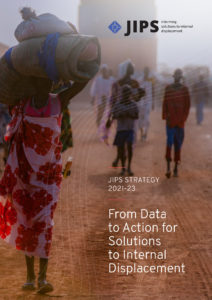 Bringing together governments and international and local actors around the process of profiling has been the cornerstone of JIPS’ work for the past 12 years. Over time, we have witnessed the multiplying and long-term impact that collaborative profiling achieves, by building both national commitment and capacity in addition to the evidence it generates. With the ever-changing displacement landscape, the profiling process has also evolved over time – as has our portfolio of services, broadening to adapt to the challenges, needs and various levels of political commitment and capacity of the diverse contexts and stakeholders we support.
Bringing together governments and international and local actors around the process of profiling has been the cornerstone of JIPS’ work for the past 12 years. Over time, we have witnessed the multiplying and long-term impact that collaborative profiling achieves, by building both national commitment and capacity in addition to the evidence it generates. With the ever-changing displacement landscape, the profiling process has also evolved over time – as has our portfolio of services, broadening to adapt to the challenges, needs and various levels of political commitment and capacity of the diverse contexts and stakeholders we support.
Building on the progress made over the last twelve years, and on our comparative advantage within the evolving data landscape that we navigate in at the global and country levels, we see four key areas with persistent challenges that we will work to overcome in 2021-23:
Progress in all four areas will be facilitated by engaging in complementary efforts with our current strategic partners and by forging new partnerships. These will include national and local governments as well as national statistical offices (NSOs), UN agencies and civil society from the humanitarian and development realm, and actors from the urban context, academia, donors, and – importantly – displacement-affected communities themselves.